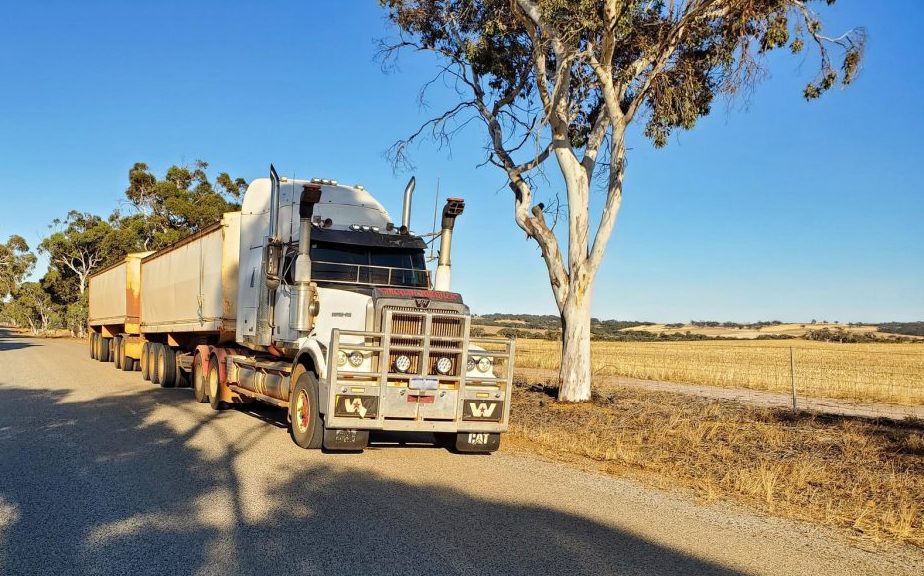
A Grattan Institute report recommends changes to the Fuel Tax Credits Scheme which would affect on-road and off-road users. Photo: Darryn Browne, Koojan
THE National Farmers Federation and GrainGrowers Limited are calling on the Federal Government to rule out changes to the Fuel Tax Credits Scheme.
This call comes after the Grattan Institute released a report arguing that the scheme should be cut, saving the budget $4 billion annually.
Titled Fuelling budget repair: How to reform fuel taxes for business, the report claims that only about half of the outlay is justified in economic or social terms.
The report recommended that fuel tax credits should be removed for heavy on-road vehicles, increasing the effective fuel tax rate to 47.7 cents per litre.
It also proposed that fuel used off road should receive a reduced credit of 25.6c/l, increasing the effective fuel tax rate to 22.1c.
Report lead author and Grattan Institute Transport and Cities Program Director Marion Terrill said making changes to the scheme would also help Australia hit its target of net-zero emissions by 2050.
“Cutting fuel tax credits would be a win-win: it would shrink the budget deficit and help Australia hit net-zero carbon emissions by 2050,” Ms Terrill said.
“[C]utting fuel tax credits in the way we recommend would have next-to-no impact on household budgets – we calculate that prices at the supermarket would increase by an average of just 35 cents on a $100 grocery shop.”
NFF president Fiona Simson disagreed with the Grattan Institute’s findings.
She warned that slashing the scheme would be economically disastrous and would send a cost-of-living shockwave down the supply chain.
“Farmers are already battling a cost-of-farming crisis, with fuel, fertiliser and other inputs at historically high levels,” Ms Simson said.
“We’re seeing this reflected in the food price inflation causing pain for families at the supermarket checkout.
“Levelling billions in new taxes on the supply chain is a recipe for further inflation.”
Proposal lumps tractors in line
Ms Simson said that as a road tax, it made no sense to extend fuel excise to off-road vehicles, as proposed by the Grattan Institute.
“Imposing a road tax on vehicles that don’t use roads just doesn’t stack up.
“Tractors and boats don’t drive on roads, so they shouldn’t pay road tax.”
NFF vice president and Wimmera region grain farmer David Jochinke said the proposal to pay fuel excise for off-road use would cost his business dearly.
“We use around 80,000 litres of diesel each year to plant and harvest crops,” Mr Jochinke said.
“On a typical farm like mine, the proposal that’s been floated would equate to an annual tax of nearly $18,000.
“That’s on top of high prices for fuel, fertiliser and power that have really pinched in recent years.”
GrainGrowers echoes call
GrainGrowers chair Rhys Turton said the call was poorly timed and ill-advised, highlighting a fundamental lack of understanding of the current pressures facing agricultural supply chains.
Mr Turton said the Fuel Tax Credit Scheme helped ensure fuel used on-farm to produce food did not carry an additional heavy financial burden.
“These vehicles are not using our roads, and any cuts would effectively force growers to subsidise road users.
“The system as it currently stands ensures farmers are not disadvantaged in the production of essential goods.”
Mr Turton said the grains industry faces significant cost pressures caused by damaged supply chains, and additional unnecessary costs could not be tolerated.
“Damaged supply chains have already cost the Australian economy $5 billion, with family budgets taking a hit from the resultant skyrocketing food prices.
“Changes to the scheme would deliver higher costs and reduce the ability of farmers to continue to produce high-quality food efficiently.”
“The simplistic solution is flawed as it would actually diminish the ability of farmers to adapt and respond to the challenges of climate change.”
“A cornerstone priority for GrainGrowers is working to help farmers understand their carbon footprint and transition to a lower carbon future.”
Mr Turton said the Grattan Institute’s suggestion that farmers switch to low-emission machinery and technology was not feasible at present.
“GrainGrowers and the broader industry have investigated the work being done on alternate energy options for powering farm machinery, and while we support this innovation, the reality is that a practical solution is some time away.
“We do, however, look forward to working with experts to accelerate the development and uptake of alternative energy options, as they become available.”
Mr Turton said farmers across the country facing skyrocketing inputs prices would be horrified by this simplistic and ill-informed call for cuts to the fuel tax credits.
“The government must take into account the impact on primary industry and dismiss the call,” Mr Turton said.
Source: NFF, Grattan Institute, Grain Growers

HAVE YOUR SAY